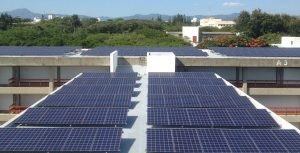Lebanon
Lebanon’s arid / semi-arid climate makes it vulnerable to the impacts of climate change. Lebanon is a developing country that faces endogenous growth challenges and because of its location in a region with tremendous tensions faces exogenous factors that add extra burden on national resources. Lebanon views climate change as a threat multiplier to its current socio-economic and political struggles. On top of the current public debt crisis and social unrest, estimates of the cost of climate inaction are as high as $80.7 billion in 2040.
In its NDC, Lebanon expects to achieve the following targets:
- An unconditional GHG emission reduction of 20% compared to the Business-As-Usual (BAU) scenario in 2030, (amounting to 7,790 Gg. CO2e), through 18% of the power demand and 11% of the heat demand from renewable energy sources with 3% reduction in power demand through energy efficiency measures.
- A conditional GHG emission reduction of 31% compared to the Business-As-Usual (BAU) scenario in 2030 (amounting to 12,075 Gg. CO2e) through 30% of the power demand and 16.5% of the heat demand generated from renewable energy sources and 10% reduction in power demand through energy efficiency.
Lebanon will increase its resilience to climate change in tandem with enhancing resilience against economic shocks and other possible disasters. Therefore, Lebanon is prioritizing the synchronization of adaptation action with the implementation of the Sendai Framework for Disaster Risk Reduction, the Agenda 2030 for Sustainable Development, the United Nations Convention to Combat Desertification, and the United Nations Convention on Biological Diversity. Moreover, Lebanon acknowledges that vulnerable groups, especially women, are disproportionately impacted by climatic events, and will therefore commit to render climate adaptation action gender responsive.
- Regenerative agriculture.
- Nature Based Solutions.
- Renewable energy and energy efficiency
- Waste and sanitation management
More specifically, training can focus on:
- Public private partnerships
- Identification, design and development of impact and bankable infrastructure projects
- Access to Green Finance opportunities
- MRV process at the local level and linkage/reporting to the Ministry of Environment.
- Solid Waste Management Facilities for Metn and Batroun Caza (Energeco s.a.l)
- Green Arms PV PPA – National Programme for Solar Energy in Lebanon (NASEL II) (Green Future Holding Lebanon)
- National Action for Green Energy Efficient Buildings (NAGEEB Program) (Rational Financial Holding)
- Agricultural Rural Development Initiative (ARDI) (Green Future Holding Lebanon)
- Provision of data and information for the country’s SCF profile (16 June 2021).


